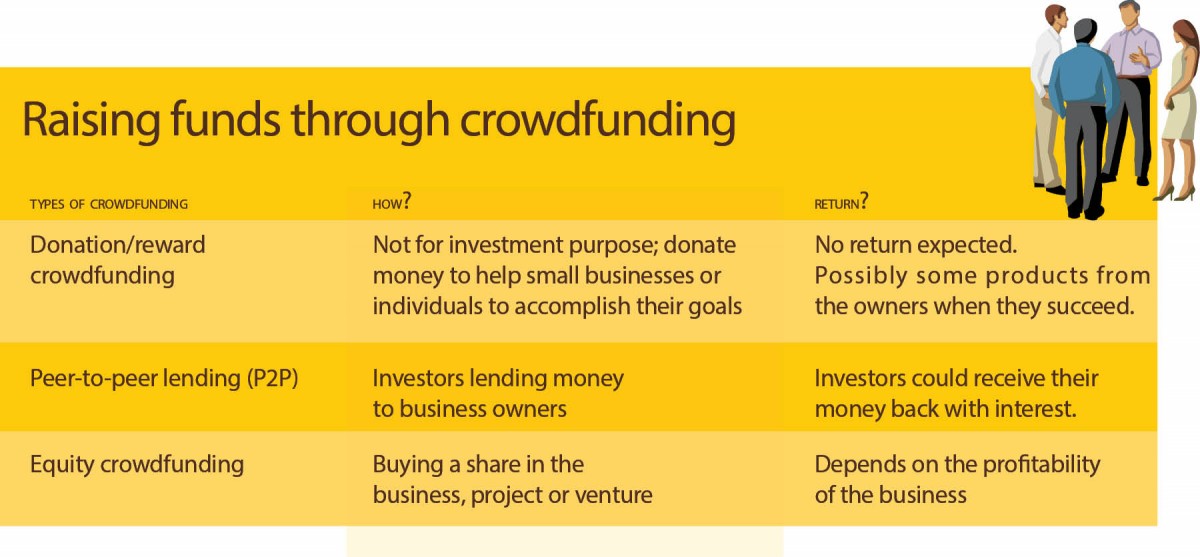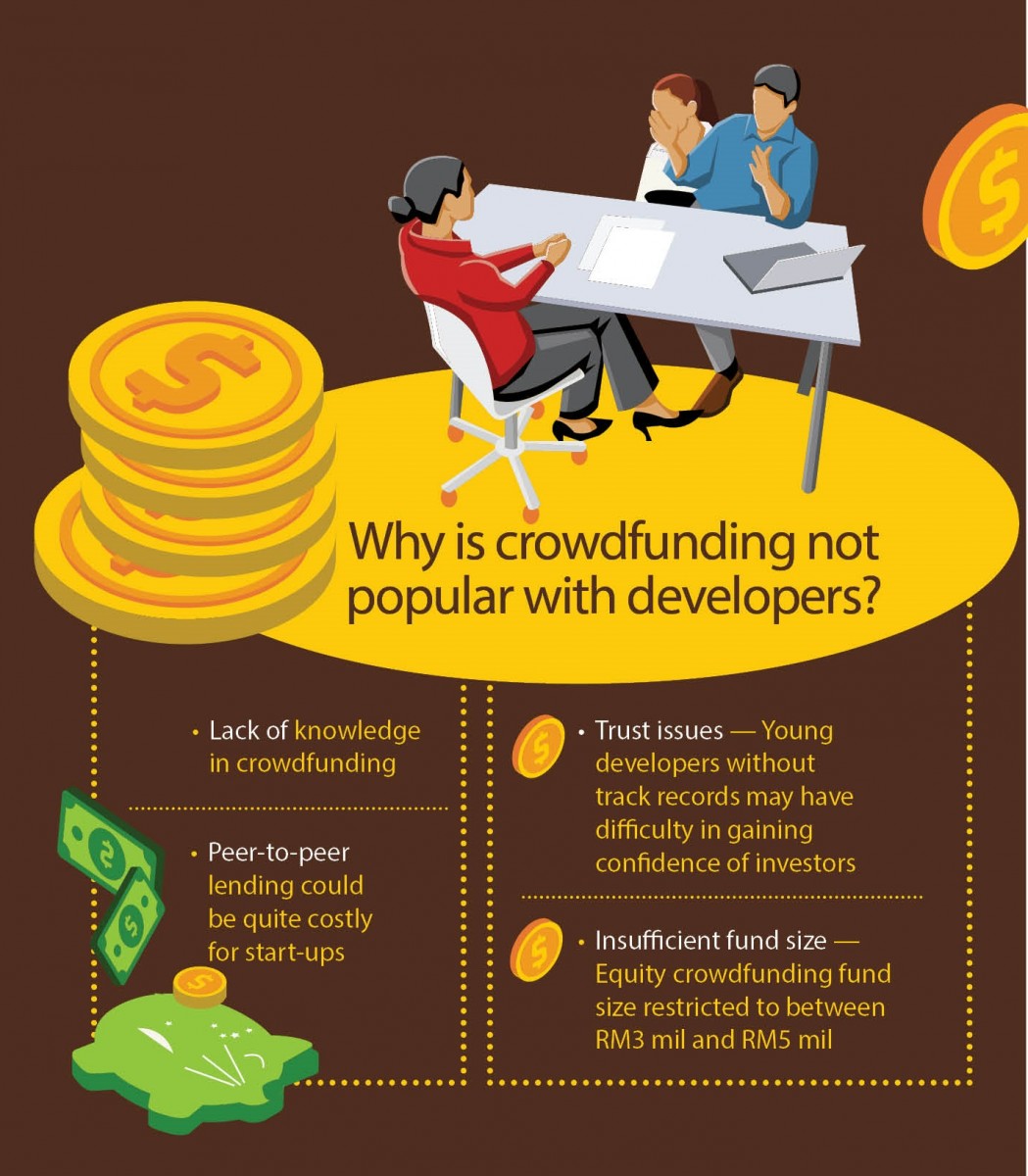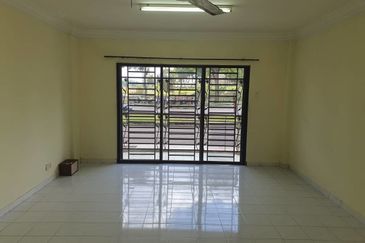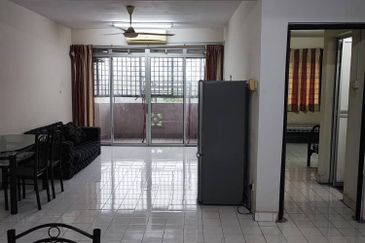

CROWDFUNDING is not something new for present-day retail and technology start-ups that need funds to kick-start their businesses. However, the idea of crowdfunding in the real estate industry, to fund the development of property projects in particular, seems rather far-fetched and difficult to realise.
Equity crowdfunding platform CrowdPlus.asia chief operating officer (COO) Bryan Chung has been approached by many real estate industry players about raising funds through crowdfunding. But they often give the idea a pass after knowing the limited fund size that they could raise.
As crowdfunding is still new in the Malaysian market, Chung says, the Securities Commission (SC) has established a framework for equity crowdfunding (ECF) to protect investors.
In the framework, the SC has set the amount of capital raised through ECF to be limited to RM5 million where the issuer is only allowed to raise a sum of up to RM3 million within a year through a single ECF platform. Nevertheless, the additional sum of RM2 million can be raised the following year.
“For real estate projects, the current limit is RM3 million to RM5 million which is clearly not sufficient for any property development,” he tells TheEdgeProperty.com.
According to the definition by the UK Crowdfunding Association, crowdfunding is a way of raising funds by asking a large number of people for a small amount of money each to finance a business, project or venture into a business.
There are three methods of crowdfunding: donation/reward crowdfunding, debt crowdfunding (also known as peer-to-peer lending (P2P lending)) and equity crowdfunding.
People who participate in donation or reward crowdfunding are considered as donors who contribute the money for a social or encouragement purpose to help the small business or individual accomplish their targets, such as a charity project or for operating funds for small businesses. Some donors might receive the end-product from the business owners while others may not receive anything in return.
Meanwhile, debt crowdfunding allows for the lending of money bypassing traditional banks. Investors could receive their money back with interest.
On equity crowdfunding, investors are buying a share in the business, project or venture. The returns depend on the profitability of the business.
It’s not just about funding property developments
Apart from the limitations to the fund size, P2P Venture Sdn Bhd COO Kristine Ng says lack of knowledge is another reason that the idea of crowdfunding is not being considered by many companies.
However, Ng, who has handled more than 20 crowdfunding projects, sees great potential for this in the real estate sector. Although there are limitations on crowdfunding, Ng says there are areas that property developers or business owners could explore.

“For example, if developers are already given lending licences to provide housing loans to homebuyers, real estate crowdfunding may be a way for them to raise funds to finance the mortgage loan scheme,” she suggests.
She notes that there are investors who are interested in investing in real estate but are not interested in purchasing physical assets.
This group of investors currently have a choice of either investing in real estate investment trusts or buying shares of listed property development companies through the equity market.
“There are other ways as well. For instance, small business owners could raise funds through P2P lending to purchase the properties for business purposes. There are many crowdfunding activities that the property development industry could explore,” adds Ng.
P2P lending, in simpler terms, is where an investor lends to businesses or individuals via online platforms that match lenders with borrowers.
Global real estate crowdfunding activities are growing
Chung says real estate crowdfunding activities have gained momentum overseas such as in Europe, the UK and Middle East.
“In Asia, Singapore has crowdfunding platforms that focus on real estate, including for the financing of development projects, buying land bank or investing in income-yielding assets,” he adds.
These platforms include CoAssets Ltd, FundPlaces established by Ferrell Asset Management Pte Ltd, and DomaCom Ltd. The annual returns range from 3% to 20%, depending on the property types.
Among them, CoAssets is on route to listing on the main Australian Securities Exchange in September 2017 and has raised S$6.72 million (RM21.04 million) in a public offering.
Back in Malaysia, crowdfunding in the real estate sector is taking baby steps with RE/MAX Malaysia putting up 6% of shares of Malaysia’s trademark licence holding company Kellerhof International Sdn Bhd for equity crowdfunding. RE/MAX is one of the largest real estate network operators based in the US.
The equity crowdfunding exercise has seen all 80 lots of shares fully subscribed raising RM400,000 in operational capital for the company.
However, RE/MAX Malaysia founder and regional director Andre Keller stresses that the main objective of the ECF is not about fund-raising but to let more people know about the RE/MAX brand and get more industry players to join them.

This is also the first real estate-related crowdfunding activity in Malaysia, and it is handled by CrowdPlus.asia.
Chung, who is in charge of the deal, also stresses that besides being an avenue to raise funds, crowdfunding could also become a marketing or brand-building tool for business owners, especially property developers who want to increase their exposure or reward their loyal customers.
“For instance, developers could offer a crowdfunding programme on certain projects to let loyal customers have the opportunity to invest and tap into the company’s growth,” he adds.
Newcomer exploring possibility
A newly formed property development company — Oxbridge & Mak Group (O&M) — is looking at the possibility of raising funds through crowdfunding.
The company is collaborating with the landowner, Abadi Baiduri Sdn Bhd, to jointly develop a mixed development in Sungai Besi, Kuala Lumpur, with an estimated gross development value of RM300 million.
O&M chairman Alan Mak says the company wants to raise an investment fund of up to RM10 million in 1H2017 and another RM20 million in 2H2017 to jump-start the development.
“We are exploring various fund-raising platforms, including crowdfunding, to enable the wider public to be involved in the development.,” he says.
As the fund size is limited, Mak notes that equity crowdfunding might not be viable at present and is considering to initially raise funds through debt lending.
Evaluate risk appetite before investing
Like any other investment tool, Ng from P2P Venture warns that investing through crowdfunding also has its risk although the returns could be rather attractive.
“For P2P lending, the returns range from 5% to 18%. But one must bear in mind, the higher the returns the higher the risk. In any investment, always balance your investment portfolio and do not put all your eggs in one basket,” she adds.
Chung from CrowdPlus.asia concurs that investing in crowdfunding is like investing in a business, whereby there is no guarantee on returns of investments.
He foresees real estate crowdfunding to be one of the avenues for small developers to seek funding, but for this to be realised, the Securities Commission needs to have a new set of guidelines for developers, especially on the limitations of the fund size.
He says it will be a game- changer if property developers are allowed to raise funds through crowdfunding as a developer with a good track record and development land in good locations will be an attractive investment for many.

This story first appeared in TheEdgeProperty.com pullout on Feb 3, 2017, which comes with The Edge Financial Daily every Friday. Download TheEdgeProperty.com pullout here for free.
TOP PICKS BY EDGEPROP

D'Ambience Residences (Ikatan Flora), Bandar Baru Permas Jaya
Permas Jaya/Senibong, Johor

Seri Mutiara Apartment, Bandar Baru Seri Alam
Masai, Johor

Apartment Tanjung Puteri Resort
Pasir Gudang, Johor






















